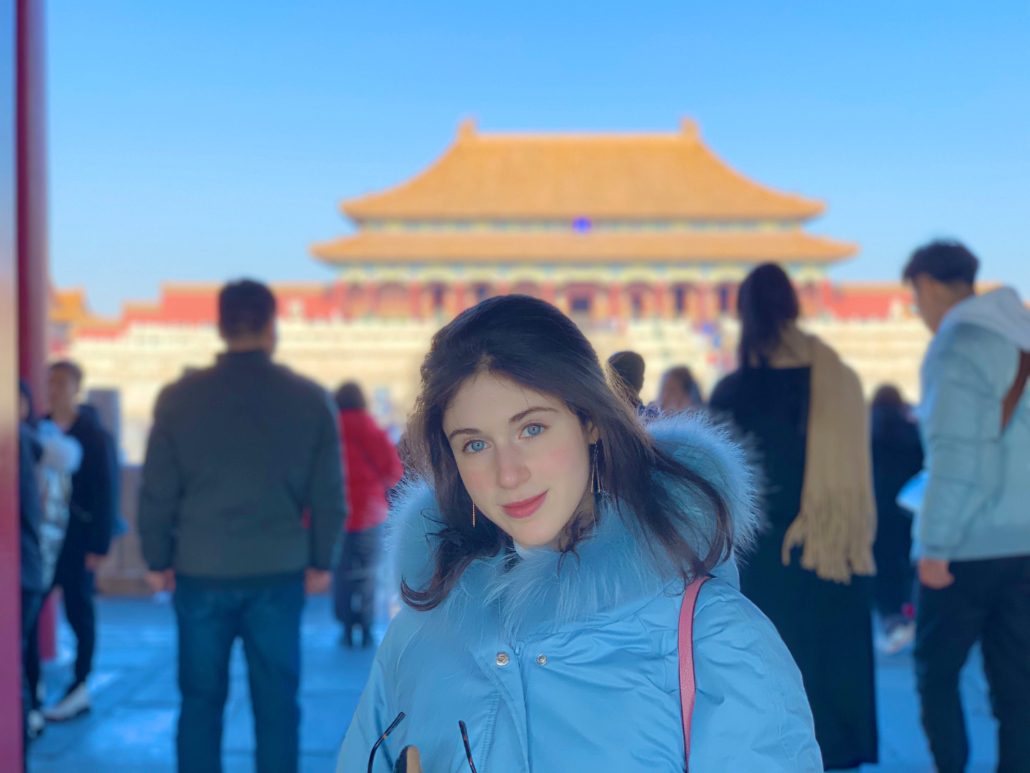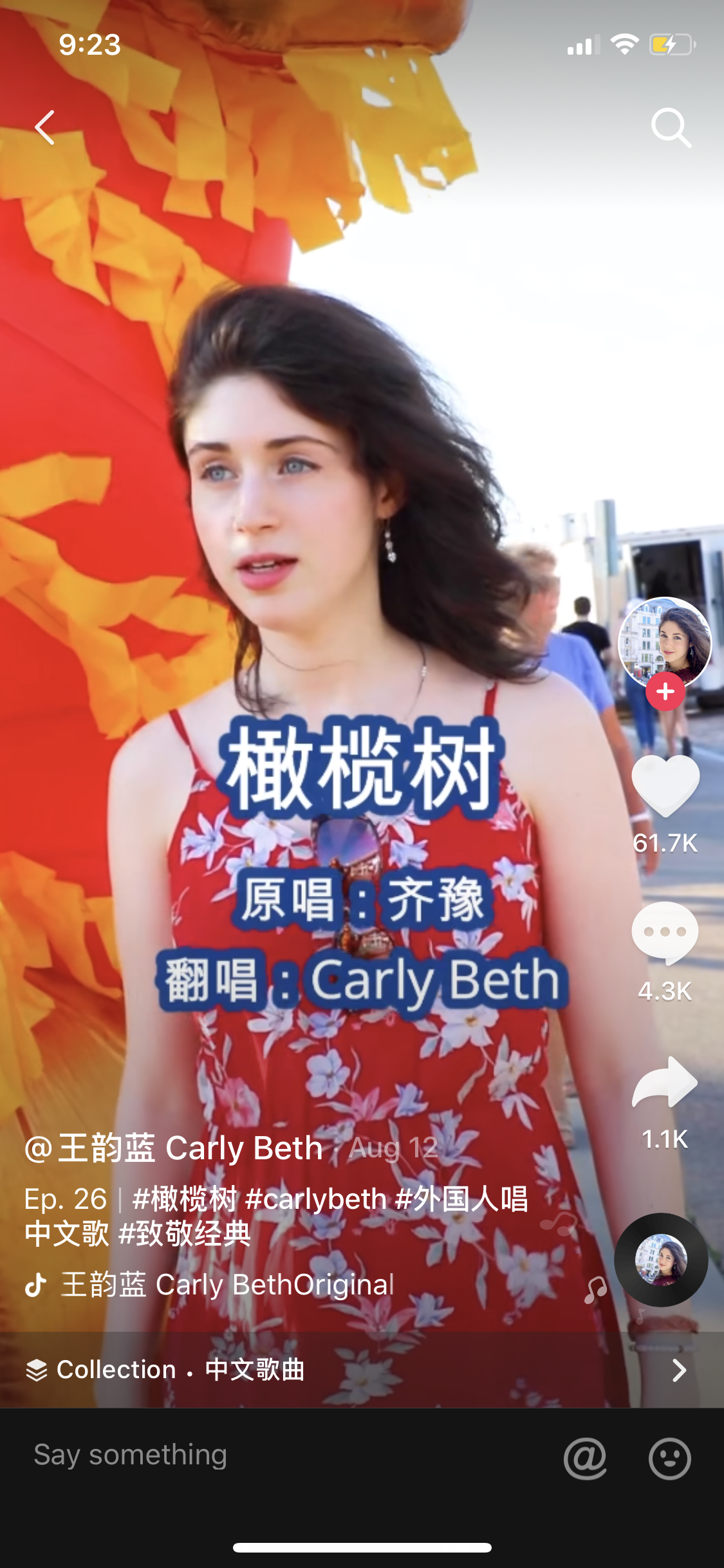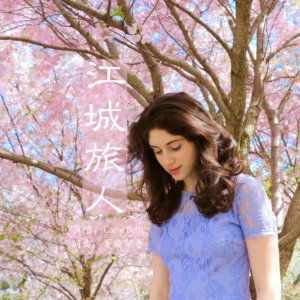Carly Beth Hand
Creating a Music Bridge to China
By: Carly Beth Hand

One rainy evening in London, I was playing and singing my original songs alone in a university practice room. Out of nowhere, I heard a loud knock on the metal door. It was a Chinese acquaintance that I had spoken to briefly before. She must have heard my music through the walls and asked to come in and listen. After hearing my songs, she was really excited, but I never expected what she would ask next.
“Would you like to livestream to China?” she asked. At this point I knew no Chinese, not even ‘Nǐ hǎo.’ “What do you mean?” I questioned. She explained, “We can livestream you playing the piano and singing. I’m sure the Chinese audience would love you.”
Although hesitant at first, I decided to give it a try. During that first livestream, I was behind a battered grand piano in a dark practice room, without a microphone, singing and chiming in, “Nǐ hǎo” as many times as possible. I expected the livestream to go terribly, but by day three, we already had ten thousand live viewers! The comments were going crazy, showering me with positive words and compliments. I felt so grateful for this audience who loved my music, I promised myself I would come up with a way to thank them and to communicate with them - and the first step was to learn Chinese.
The following nights I went home and stayed up until four in the morning, teaching myself as many Chinese words as I could stuff into my brain. I was filled with exhilaration with the thought of communicating my gratefulness to them. I spent every afternoon live streaming with my Chinese friend. But when summer arrived, I needed to fly back home to New York. That meant I would now have to livestream without her. The problem was, if I could only speak a few sentences, how could I communicate with them? Well, I found out that week. The answer? Singing in Chinese!
My friend recommended I sing a very famous song in Chinese, 《后来》。The second I listened to it, I had tears running down my face. I knew I had to learn this song. Within two weeks after learning how to say Nǐ hǎo (你好), I learned how to sing the song by listening to it in slow motion and practicing my mouth gestures to get my pronunciation right. I even filmed the whole music video for the song right afterwards. When I sang the song and posted it to my fans, they were shocked and stunned.
Although my pronunciation was not perfect, they were so happy to hear me, a foreigner, singing their language and showing love to their culture.
 Learning Chinese wasn’t the only thing I stayed up until 4am for. I continued live streaming every day, often until 3 AM New York time so that it was a convenient hour for viewers in China. I kept learning new Chinese songs and expanding my repertoire. Two months later, I had up to 110,000 viewers at once. My profile picture was on the front page of the app, and I was number one out of millions of broadcasters. The manager of the app contacted me sharing how much he loved my broadcast, and viewers revealed that my broadcasts helped them to feel happy again. I felt elated and so powerful that I was able to spread positivity to viewers. Then a crazy thing happened - an avid viewer virtually gifted me thousands of dollars over several months for singing her favorite songs and to support my career in China. I was stunned and forever grateful. I used the money to invest in my song production.
Learning Chinese wasn’t the only thing I stayed up until 4am for. I continued live streaming every day, often until 3 AM New York time so that it was a convenient hour for viewers in China. I kept learning new Chinese songs and expanding my repertoire. Two months later, I had up to 110,000 viewers at once. My profile picture was on the front page of the app, and I was number one out of millions of broadcasters. The manager of the app contacted me sharing how much he loved my broadcast, and viewers revealed that my broadcasts helped them to feel happy again. I felt elated and so powerful that I was able to spread positivity to viewers. Then a crazy thing happened - an avid viewer virtually gifted me thousands of dollars over several months for singing her favorite songs and to support my career in China. I was stunned and forever grateful. I used the money to invest in my song production.
Later on, I started posting all of my videos to the app DouYin (抖音), the Chinese version of Tik Tok. Although it started off slow, in a few months, my videos started going viral with millions of views on 抖音. Even Chinese acquaintances who barely knew me from my university in London started contacting me, telling me they found my videos on 抖音. Chinese people living in America, Canada, and Australia also found me. It was like the whole world was coming together, because of music, sending me such positive messages that encouraged me to continue my Chinese music journey.
My avid viewer eventually found me on this app too. As we became good friends, she invited me to China. I hadn’t been to China before, and this whole time I had only been connecting with Chinese people virtually. She wanted to help me get started with my career in China and invited me to stay with her. Of course I said yes! My mom and I flew the long magical trip to the other side of the earth. The minute I arrived I was immersed in Chinese culture. My friend taught me all about Chinese habits and eating styles, and I adapted immediately. It was so enlightening.
By now, while still posting on 抖音, I decided I wanted to release my own Chinese songs to my audience, something that had more of me in them. That’s when a little bit of magic happened from 抖音 - it led me to a Chinese composer. He was looking for someone to sing his pop songs, and I was looking to sing them, (as I can’t write lyrics in Chinese yet). We met up and immediately hit it off musically. The Chinese composer and I decided to post some of his Chinese songs together - and all of the Chinese fans loved them - and begged us to create an album.
Throughout my journey, I often volunteered to sing and perform at the local Chinese community’s spring festivals and events. At one autumn concert in particular, I was told about the Confucius Institute, and how great it is to learn Mandarin and Chinese culture with them. Up until this point, I had only been teaching myself Chinese, so I thought this would be a great idea - I’ll take two classes at once!
I was more than delighted to meet all of the amazing teachers at the Confucius Institute, including Mark Yin/尹老师 and 郭老师/Wen Guo, and experience an amazing community. Equipped with my new knowledge from the classes, I set off on my second trip to China. The purpose of this trip was to enhance my understanding of Chinese culture to help me prepare for the album I am working on. I visited Beijing, Xi’an, and Yinchuan. I met with a lot of inspiring people. We even met up with Annie, 唐伯虎, a famous British-American singer who lives in China and sings in Chinese, and took a trip to GuYuan to watch her performance. 
This past March, we released a song called “江城旅人“ (Jiāng Chéng Lǚ Rén) also known as “River City Traveler” in response to the recent world pandemic. It highlights the city of Wuhan’s great qualities, and sheds light on all of the beautiful places there. “The lyric: “春天就要来了,我想去找你看樱花” describes looking forward to the spring’s beauty, to represent a bright future, instead of the dark past.
Now that I am creating an album with the composer, my aim is to show my love for Chinese culture through music. Because there are a lot of Chinese people living in the US, Canada, and all parts of the world, I really feel that this album can connect all people globally.
As a foreigner singing in Chinese, I believe I can help spread the beauty of Chinese culture, language and music to the world’s ears. “独乐乐不如众乐乐”(dú yuè lè bù rú zhòng yuè lè). I’ll sing for you.
Carly Beth Hand
Confucius Institute at University of Buffalo
Carly Beth is a pianist, songwriter, and singer from New York. She began the piano at age five, and released an album of piano solos at age 15 called Taking Flight, which won her the opportunity to perform on stage with Jim Brickman during his winter tour.
While in college, a friend introduced her to live-streaming to China, so she quickly began teaching herself Chinese and Chinese songs. To her surprise, her playing the piano and singing live-streams gathered an audience of over 100,000 live viewers. She has grown her fanbase in China now with over 600K followers across Chinese social media. She has also released several Chinese songs, one of which is called《背影》 (BeiYing) which can be found on most streaming platforms.
She is currently working on a Chinese album, and posting videos on 抖音 (DouYin), in addition to continuing her Chinese language studies. You can find her on Instagram, Facebook, YouTube, and Chinese social media under the name “Carly Beth.”

